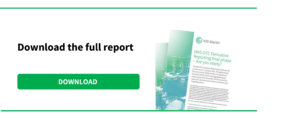
Are you ready for MAS OTC Derivatives Reporting Next Month?
Next month is going to be busy for Singapore-regulated companies as the final phase of MAS OTC reporting will go live on 1st October 2021. As compared to the previous phases, this phase will impact significantly more institutions across fund managers, insurers, finance companies, quant-trading firms, commodity trading firms etc. Those who have been reporting will need to report on the activities with further asset classes while many will be dealing with trade reporting for the first time.
Especially for the first timers, this is particularly challenging given the complexity of trade reporting and the heightened regulatory expectations. This article explores several of the key challenges faced by the industry.
Implementation
With trade reporting projects, the most time-consuming and costly implementation effort is typically the capturing, mapping, and transformation of trade data from multiple in-house systems, each with its own data format, workflow behavior and connectivity, into the format and connectivity required by the trade repository. This effort includes not only the voluminous mapping of specific trade data fields under new trade scenarios, but also the conditional mapping of those data fields under dozens of different post trade lifecycle events. To overcome this challenge, it would be prudent to work with a vendor or have an in-house team with specialized implementation knowledge on MAS reporting in order to reduce the effort and related risk of poor implementation.
Regulatory Expertise
Dealing with the complexity of trade reporting demands specific subject-matter experts. Interpret the guidelines and requirements set out by the regulators and trade repositories is not always straightforward. Furthermore, there is a constant need to monitor and respond to regulatory changes. For instance, MAS recently issued a consultation paper (P009) on the harmonization of unique trade identifier (UTI) and critical data element (CDE) which will impact firms in implementing their MAS reporting regime over the next few years. In this situation, knowledge is power, and you would want to seek out regulatory reporting experts to guide your reporting. For instance, IHS Markit participates in regulator consultation papers to align with industry best practices and regulatory changes. Our product managers actively engage in various working groups including ISDA, AIMA, ASIFMA, etc. to provide global and regional coverage on regulations.
Technology
As the regulation continues to evolve, regulatory reporting software or internal process need to be aligned with the changes in regulatory requirements or technical standards (including costly “re-architecture” by the trade repository or “re-writes” by the regulator). This is time-consuming and resource draining, which makes it difficult for institutions to focus on their strategic initiatives. As compared to inhouse solution, firms can enjoy the economies of scales of a third-party vendor who is able to amortize the cost to implement industry changes across their large base of clients, drastically reducing the cost that a firm would otherwise incur to adapt to such changes.
IHS Markit is deeply committed to the regulatory reporting solution business and has been supporting clients for MAS reporting since 2013, along with other global regimes. We offer a single integrated reporting platform that automates the reporting process and enables a strategic reporting focus, rather than tactical reporting. We integrate with all types of data sources and formats to provide a full reporting workflow across submission, data management, reconciliation, and monitoring.
Talk to us about how we can help you comply with the latest MAS reporting requirements here.







